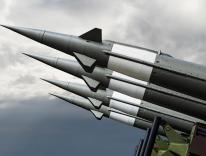
Many Americans were rubbing their foreheads last week, perplexed as to why Brian Williams, who held a full-house of money, fame, and movie-star good looks, would concoct stories about flying in a helicopter under fire in Iraq. Psychologists have suggested the possibility that, with all the adrenaline pumping during his Iraq assignment, Williams might actually remember what did not happen. Come on. But how else to explain why one of the most recognizable media figures in the United States would make up stories of derring-do?
The nineteenth-century author Stephen Crane provides an answer. In 1895, Crane published his classic Civil War tale, The Red Badge of Courage. From the start, the protagonist, a Union soldier named Henry Fleming, is haunted by the thought that when shots are fired, he will break ranks. In his first battle, fear gets the best of him and he flies in retreat. Fleming despairs deeply over his actions but then in a later engagement, he holds his ground, fights like a Viking, and receives a head wound—his red badge of courage. The red badge of courage is an outward sign that Fleming has transcended himself—his will to live—by voluntarily facing death on the battlefield.
No matter how accomplished, no matter how many titles and beach houses they accumulate, men—and I do think this may apply more to men than to women—crave some kind of red badge. There is a powerful sense of agency and autonomy that comes with being a big-shot media star, or, for that matter, a millionaire hedge-fund operator. But as the German philosopher G. W. Hegel taught us in his famous lord-and-bondsman passage, there is a more profound sense of freedom and self-assurance that can be purchased only by mastering the ultimate enemy—the fear of our own demise. All, or at least most men, still crave that experience, that guarantee that they are not slaves to the terror of death.
As a young boy growing up post–World War II America, my after-school hours were often spent in mock gun battles. Much like the ancient Romans, my pals and I dreamt of war and battlefield glory. John Wayne movies, which were only slightly less nuanced than Eastwood’s American Sniper, fueled fantasies of combat and Audie Murphy–like heroics. But things have changed. Since the draft disappeared and the deceit and debacle of Vietnam problematized military values, most boys no longer grow up à la Henry Fleming—dreaming about the tests and glory of the battlefield.
And yet, while the need for that red badge of courage may now be muted, it persists. The Hollywood heroes of today might be a little more complex, but they parade the same true grit as the sensitive tough guys of old. We still admire, and would love to be like, the hero of American Sniper or Saving Private Ryan, or even The Grand Torino: reluctant to kill but driven to risk our lives in order to save others.
Brian Williams was a former football player, but that did not give him the street cred he craved, or the self-assurance that only facing mortal danger can provide. And so he embellished. This is pure speculation on my part, but I don’t think the highest-rated anchorman in network news was trying to pump up his ratings with anyone but himself. Williams wanted his red badge of courage.


